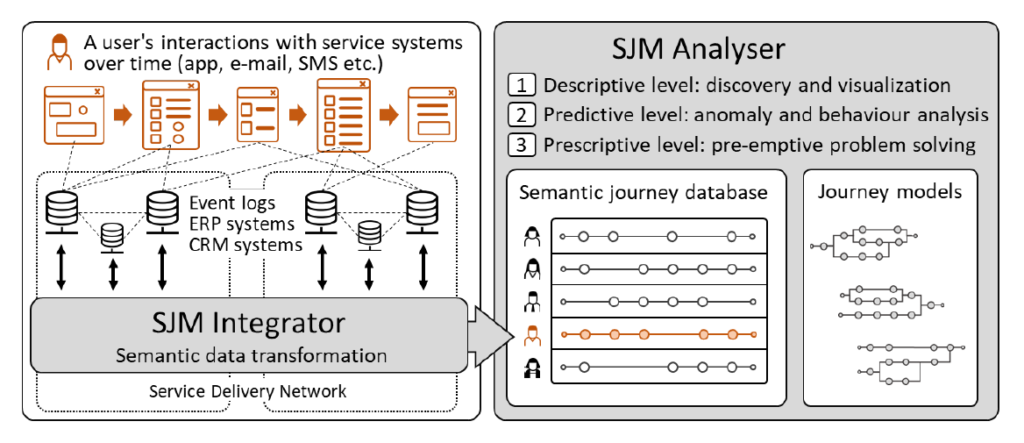The digitalisation of our society’s service systems has fundamentally changed the way services are delivered to, and experienced by, humans. Although digital services are supposed to simplify our lives and increase our efficiency, they often frustrate and burden customers, users, and employees.
The overall goal is to increase the quality of services and support the successful digitalisation of services by uniting research on process mining and customer journeys using new developments in logic-based analysis and artificial intelligence. The partners are SINTEF Digital, University of Oslo, and Eindhoven University of Technology.
Based on user journeys we will analyse, model, and observe how humans experience digital services, rather than taking the perspective of service providers and service systems. The main source of data comes from two complementary service providers: GrepS, a start-up company offering software services for analysing programming skills, and Telenor, a telecom company offering a wide range of mobile-, broadband- and TV services in the Nordics and in Asia. We will trace data left from users in various systems during repeated interactions with a service over time, on the level of individuals.
In the first phase of the project, we will build tools for automated capture of repeated user interactions in digital channels. Based on the resulting database of user journeys and user models, we will use logic-based techniques and machine learning to expose deviations and predict possible behaviours. The accumulation of user journeys will also enable identification of patterns that optimize the user experience and service quality.
We will extend and use executable modelling languages and their associated analysis tools to describe, predict, and prescribe user journeys as concurrent processes. We will base these languages and analysis tools on formal methods and concurrency theory, which build on the foundation of theoretical computer science.
Project Summary
Public and private service providers are under pressure to digitalise their service offerings, and the opportunities for increased flexibility and efficiency are huge. However, the digital transformation continues to frustrate and burden users, citizens and customers.
The Smart Journey Mining (SJM) vision is to support successful digitalisation by extending the research front in process mining and service science with recent advances in formal analytics and artificial intelligence. The overall goal is to develop a theoretical fundament and a process analytics framework based on formalized user journeys.
Process mining allows organisations to reverse-engineer their business processes by analysing digital traces left in information systems. However, process mining as a research field does not have a profound user focus, and new methods and tools are needed. We will develop a theoretical foundation and prototype tools to capture and transform user data of varying granularity levels into a semantic user journey database. This will form the basis for developing user journey analytics at three levels: (1) a descriptive level for discovery and monitoring; (2) a predictive level for anomaly detection and possible behaviours; and (3) a prescriptive level for pre-emptive problem solving and service recovery. This SJM Analyser will be a tool for user-centred process analytics and simulation. By involving two service providers, the analytics will be validated against empirical investigations of the user experience in realistic service environments.
SJM will provide researchers and analysts the necessary methods and tools to work across backend systems and detect patterns in vast volumes of user data. This will inform novel guidelines for the successful digitalisation of services. The SJM results will be made available to academia, industry and the public sector, thus supporting improved service quality in our society.
Project Team
- Ragnhild Halvorsrud, SINTEF Digital
- Einar Broch Johnsen, University of Oslo
- Silvia Lizeth Tapia Tarifa, University of Oslo
- Felix Mannhardt, Eindhoven University of Technology
Recent publications
- An Experiment on Transfer Learning for Suffix Prediction on Event Logs - van Luijken, M., Ketykó, I., & Mannhardt, F. (2024). An Experiment on Transfer Learning for Suffix Prediction on Event Logs. In J. De Weerdt, & L. Pufahl (Eds.), Business Process Management Workshops – BPM 2023 International Workshops, Utrecht, The Netherlands, September 11–15, 2023, Revised Selected Papers (pp. 31-43). (Lecture Notes in Business Information Processing; Vol. 492 LNBIP). Springer. Read More ...
- Building User Journey Games from Multi-party Event Logs - Kobialka, P., Mannhardt, F., Tapia Tarifa, S. L., & Johnsen, E. B. (2023). Building User Journey Games from Multi-party Event Logs. In M. Montali, A. Senderovich, & M. Weidlich (Eds.), Process Mining Workshops – ICPM 2022 International Workshops, Revised Selected Papers (pp. 71-83). (Lecture Notes in Business Information Processing; Vol. 468 LNBIP). Springer. https://doi.org/10.1007/978-3-031-27815-0_6 Abstract To Read More ...
- Early Predicting the Need for Aftercare Based on Patients Events from the First Hours of Stay – A Case Study - Dubbeldam, A. L., Ketykó, I., de Carvalho, R. M., & Mannhardt, F. (2023). Early Predicting the Need for Aftercare Based on Patients Events from the First Hours of Stay – A Case Study. In M. Montali, A. Senderovich, & M. Weidlich (Eds.), Process Mining Workshops – ICPM 2022 International Workshops, Revised Selected Papers (pp. 366-377). (Lecture Notes in Business Information Processing; Read More ...
- What Averages Do Not Tell – Predicting Real Life Processes with Sequential Deep Learning - Ketykó, I., Mannhardt, F., Hassani, M., & van Dongen, B. F. (2021). What Averages Do Not Tell – Predicting Real Life Processes with Sequential Deep Learning. CoRR, abs/2110.10225. https://arxiv.org/abs/2110.10225 Abstract Deep Learning is proven to be an effective tool for modeling sequential data as shown by the success in Natural Language, Computer Vision and Signal Read More ...

